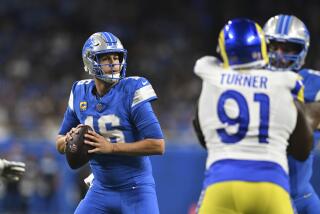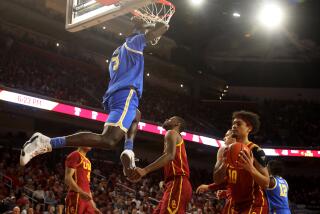EVER ELUSIVE
- Share via
PONTIAC, Mich. — The Detroit Lions are in trouble. They have a first-year coach in Marty Mornhinweg, a first-year general manager in Matt Millen, have lost their first four games and will match their worst start unless they beat the Tennessee Titans today.
Some people say the franchise is at a crossroads.
Specifically, Woodward Avenue and Cadillac Square.
There, painted on the side of Cadillac Tower No. 20, is a 14-story mural of Lion running back Barry Sanders, complete with Nike swoosh. When it became apparent that Sanders would not be returning to the NFL after retiring at the top of his game in 1999, a thin coat of black paint was applied to the artwork. A ghostly image of Sanders remains, with “Gone to Canton” stamped across his likeness.
The mural is a half-mile south of Detroit’s soon-to-be-completed football complex, meaning Mornhinweg will drive past it each day on his way to work. Or maybe he won’t.
“I don’t want to look at it,” he said. “I’ll go the long way. I’m not kidding.”
Late this week, Mornhinweg acknowledged he recently had a wide-ranging conversation with agent Peter Schaffer in which he told him the Lions would be willing to trade Sanders if he wanted to make a comeback with another team. Schaffer passed along the word to Sanders, who, according to the Detroit Free Press, said he was more interested in playing golf. By all accounts, Sanders has never said--publicly or privately--that he is interested in returning to the NFL.
Still, everyone waits for him to waver. More than two years after he abruptly quit football, his decision perplexes and frustrates his fans, his former team, and even some family members.
How could he walk away from football completely healthy, and only 777 yards shy of breaking Walter Payton’s career rushing record? What would make him so ready to retire that he was willing to repay the Lions $7.3 million of his unfulfilled contract? And why has he fallen so out of touch with an organization that structured its offense around him?
Millen has left phone messages with him several times, even visited his home just a short drive from the Silverdome. He wants Sanders to be part of the organization. Maybe not a player, maybe not a coach. Just a part.
He was, after all, the most exciting runner in football for 10 seasons. He won four rushing titles, scored 109 touchdowns, became the symbol of an entire franchise, then vanished in a poof.
“It’s real simple,” Millen said. “He was a great player. I just wanted him to be a part of it. I just wanted him to be around. A lot of guys watched him on highlights who could say, ‘Hey, there he is.’ I just think that, as an organization, it’s good for us.”
Sanders, 33, has shown little interest so far. He’s reclusive, but isn’t a hermit. It’s not uncommon to see him playing pickup basketball at nearby Oakland University or a round of golf, his newest passion, at a local public course. He’s married to a Detroit TV reporter, who gave birth to their son, Nigel, in August. Sanders also has a 9-year-old son, Barry James.
Sanders could not be reached for this story, and he has done only one extensive interview with a Detroit sports writer since walking away from football. He spoke to the reporter while playing in a local pro-am golf tournament and shed little light on his reasons for leaving. The only thing he made clear: He isn’t coming back.
That message has not changed since July 28, 1999, the day before the Lions were to report to Saginaw State University for training camp. Sanders released a 17-sentence statement to his hometown newspaper, the Wichita (Kan.) Eagle. Lion officials learned the news on the paper’s Web site.
“The reason I am retiring is simple,” the statement said. “My desire to exit the game is greater than my desire to stay in it.”
The decision was puzzling to just about everyone, even some of his closest friends. Lion receiver Herman Moore recalls touching base with Sanders during the summer of 1999.
“Camp starts next week,” Moore said. “You ready?”
“Have fun,” Sanders shot back, smiling.
Moore wasn’t sure how to interpret that.
“At first I was like, ‘Yeah, right, whatever. He’s not serious,”’ he said. “But Barry was basically telling me he wasn’t coming back. I was thinking this guy can’t be serious. Maybe he was one of those guys that would come back at the end of camp. Once seeing him, talking to him, seeing how happy and content he really was, I knew that he’s done. Make no mistake about it, he didn’t want to play anymore.”
The departure left the Lions and their fans with far more questions than answers. Then-Coach Bobby Ross penned several handwritten notes to Sanders, essentially pleading with him to return. The letters went unanswered.
Was Sanders seeking a trade? He never indicated that to his agent. Was it about money? Well, he was willing to give millions back. Sick of losing? Maybe, but he had some degree of success with the Lions, playing in six playoff games, winning two division titles and reaching the NFC championship game.
“It really seemed nothing ever bothered him, even after they would lose games,” said Sanders’ father, William, still a house painter in Wichita. “Win or lose, he’d keep the same demeanor all the time. He’d come out of the locker room after a game and, by looking at him, you couldn’t tell if his team won or lost.”
There was a backlash when he quit. Some Detroit fans held up signs reading, “Barry who?” Others booed his face when it flashed on the jumbo screen during a fight he attended at Joe Louis Arena. Longtime Detroit Tiger Kirk Gibson called him “a coward.”
“Barry Sanders should have announced his retirement before a packed house at the Silverdome,” he said. “He’s a coward for not doing it. A day before training camp? He hung his team out to dry. He never told anybody anything.”
William Sanders said he was as stunned as anyone about his son’s decision.
“He didn’t tell me anything,” he said. “I figured he was just disenchanted. I still can’t believe it. A guy can play the game for 20 years and walk away from it and it doesn’t bother him?”
It certainly bothers William. He seldom watches pro football anymore, and doesn’t even glance at it on Thanksgiving, a day traditionally reserved for Lion games.
Strange as it sounds, there was a time when William didn’t bother watching Barry--the seventh of 11 children--play football.
“Back in 1977, when he first started playing, I didn’t even think he could play,” he said. “He was a fourth grader. Smallest thing on the field. I didn’t even want to watch him practice.”
So while 9-year-old Barry played his first game for the Beech Red Barons, his father was watching Barry’s older brother, Byron, go through drills at practice.
“A friend of mine came over to me after Barry’s game and said, ‘Your son just scored three touchdowns,”’ William said. “I couldn’t believe it.”
William didn’t miss the next game, although he didn’t get out of his car. Instead, he found a spot in a parking lot overlooking the field, so he could listen to the Oklahoma-Texas game on the radio.
“While I was watching, Barry scored two or three touchdowns. Long ones,” he said. “Every time he touched the ball, it seemed like he was scoring a touchdown. A tiny little kid outrunning everybody.”
At Wichita’s North High, Sanders played wingback, receiver and cornerback, but didn’t move to tailback until the final seven games of his senior season. In those, he averaged 10.2 yards a carry. He went to Oklahoma State, where he won the Heisman Trophy as a junior, his final season.
All the while, he stayed remarkably humble and clean-living, something that made him a valuable asset not only to the Lions, but the NFL.
“I never let him hot dog it,” his father said. “He couldn’t walk around here with his shoes untied. He couldn’t walk around with no belt and his pants sagging. I wouldn’t let him. I reminded him constantly: There are a million athletes out there, you’re just one of the lucky ones.
“He couldn’t come into my house, even today, with braids in his hair or earrings in his ears, gold chains around his neck. No way. And I couldn’t care less about him being Barry Sanders, superstar. People think I’m crazy, but Barry don’t get no special treatment when he comes around here. In my house, I’m the superstar.”
That’s not to say Sanders wasn’t intensely competitive, in his own quiet way. He loved a challenge, and his Sept. 19, 1994 game against Dallas was one of his biggest. The question of the week: Who was the better back, Sanders or Emmitt Smith?
Sanders didn’t say much all week, but that Monday night he settled the issue with 40 carries for 194 yards. The Lions beat the defending Super Bowl champion Cowboys, 20-17.
“Watching Barry, it was almost like he was playing against babies when they gave him the ball,” his father said. “At every level, he had a way of making people miss him.”
Miss him? Never more than now.
(BEGIN TEXT OF INFOBOX / INFOGRAPHIC)
By the Numbers 10 :Years Sanders played in the NFL and led Detroit Lions in rushing each year.
25 :Games of 150 rushing yards or more, an NFL record.
76 :100-yard rushing games, one shy of Walter Payton’s NFL record.
237: His best rushing total in a game.
Source: Times Wire Services
More to Read
Go beyond the scoreboard
Get the latest on L.A.'s teams in the daily Sports Report newsletter.
You may occasionally receive promotional content from the Los Angeles Times.











